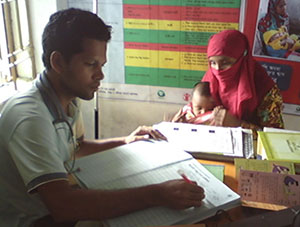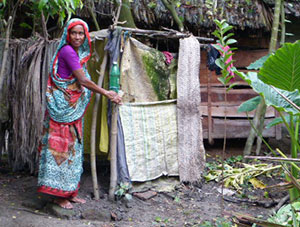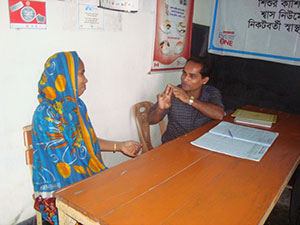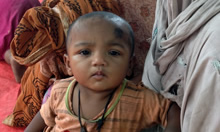
In Bangladesh, seven million children suffer from stunting caused by undernutrition, which means that they are unable to develop to their full mental and physical potential. But one health clinic in Bangladesh has become a powerful example for the improvement of nutrition in local communities with the aim of preventing stunting and maternal and child anemia.
The Atakathi Community Clinic is one of three health clinics in Bharpasha Union in Barisal Division of Bangladesh. Since 2012, SPRING/Bangladesh has provided trainings on the Essential Nutrition Actions (ENA) and Essential Hygiene Actions (EHA) to community health care providers (CHCP), health assistants, and family planning assistants in community clinics across southern Bangladesh, including the one in Atakathi. These trainings (and subsequent refresher trainings) help ensure that patients get high-quality nutrition and counseling services. We have also worked closely with Government of Bangladesh supervisory staff to provide joint supportive supervision, helping to mainstream nutrition within the health system, one key to decreasing undernutrition as a whole.
Thanks to the training and supportive supervision provided by SPRING, I have learned about creating a positive attitude about nutrition by delivering regular simple messages.
-Ratan Karmakar, Health Inspector

At the Atakathi clinic, which is equipped with modern facilities, located in a convenient spot, and decorated with colorful posters on nutrition and hygiene, Mohiuddin Mridha, the CHCP, and three other health center staff see an average of 50 patients each day. Mohiuddin and his colleagues give patients—most of whom are pregnant women and lactating mothers and their children—nutrition counseling and advise them to eat the recommended amounts of rice, fish, meat, eggs, vegetables, and fruits to comprise a diversified diet.
When pregnant women come to the clinic for antenatal check-ups, they receive iron-folate tablets and vitamin A supplements. Postpartum women are taught about immediate initiation of breastfeeding and the proper positioning and attachment needed during breastfeeding. They are asked if they are experiencing any general complications, since early diagnosis of problems can avert unwanted outcomes.
Clinic staff members also discuss the importance of hygiene. They tell patients about the benefits of handwashing and how tippy taps can be installed easily at virtually no cost. Client Rina Begum is an avid fan of the tippy tap. “This simple handwashing station is the new sensation of the area. Many households have taken the messages to heart and set up their own tippy taps near toilets and the kitchen. The name ‘tippy tap’ also has a certain ring to it and immediately piques one’s curiosity,” she says.

Clinic patients say the staff is always welcoming and helpful, which makes it easier for them to talk about personal issues and take advice. Health Inspector Ratan Karmakar says, “Thanks to the training and supportive supervision provided by SPRING, I have learned about creating a positive attitude about nutrition by delivering regular simple messages.”
The Atakathi clinic is now a source of pride for community members and a strong example for other communities seeking to upgrade and expand health care services. As Kazi Abdur Rob, a local social worker, says, “Atakathi Community Clinic has earned the trust of thousands of villagers. It has become a go-to place for primary health and nutrition services.”
